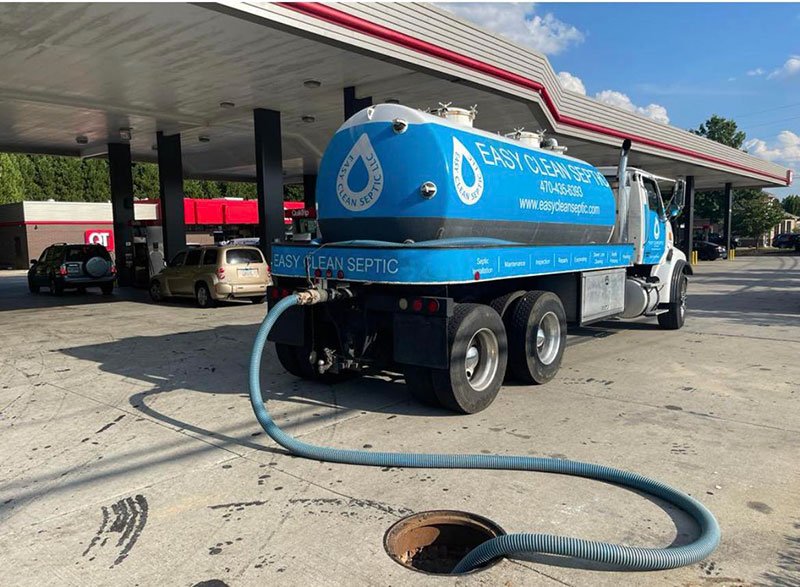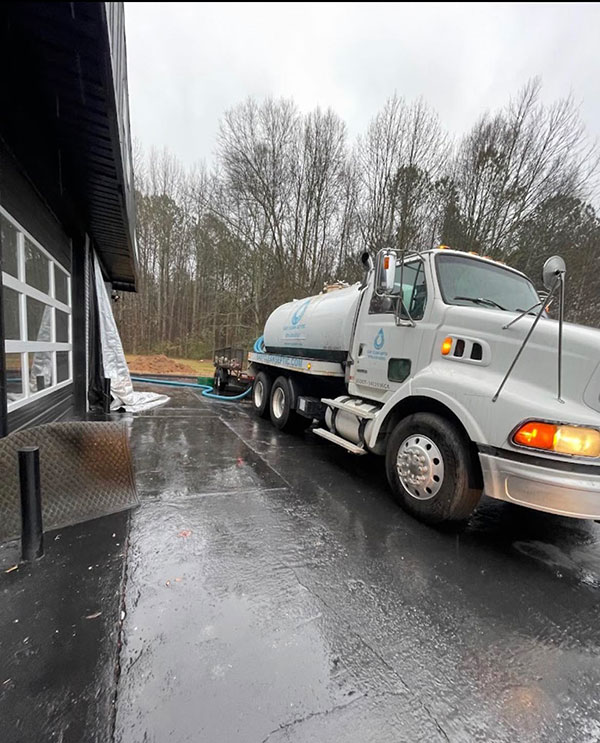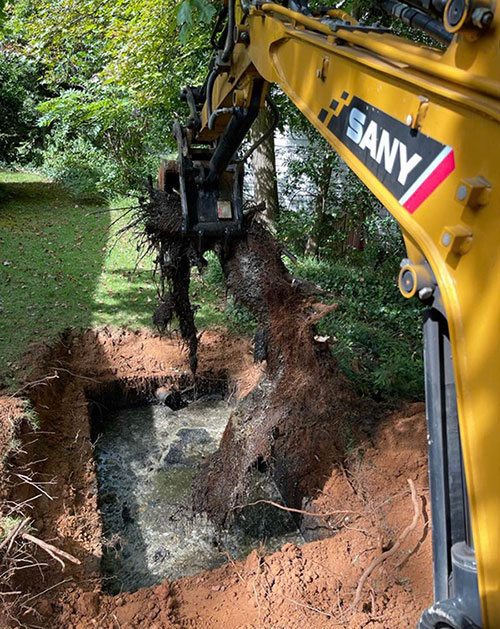Commercial Septic System Repair in Atlanta

Commercial Septic System Repair
A commercial septic system is a wastewater treatment and disposal system designed to handle the needs of larger-scale facilities, such as commercial flats, industrial facilities, or institutions.
These systems are essential in areas where there is no public or municipal sewage system is not installed. The primary function of a commercial septic system is the treatment of wastewater coming from commercial facilities in an environmentally responsible manner.
Regular repair and maintenance are essential for the betterment of a commercial septic system. It includes periodic pumping of the septic tank to remove accumulated solids, inspections to identify potential issues, and adherence to guidelines regarding what can be discharged into the system.
Why do we need sewage system repairs?
Sometimes, solid and other debris wastes are stuck in pipes or sewage systems, leading to clogging. Therefore, we use sewage system problem solving strategies.
Many problems, such as cracks, leaks, or structural damage, may affect the septic tank servicing. If the tank is not watertight, it can allow untreated wastewater to escape, posing environmental and health risks.
The leach field is a very sensitive component of the commercial sewage system, which plays an important role in the final absorption and treatment of wastewater.
In some commercial septic systems, pumps are installed to pump out waste water when necessary. Pump failures can disrupt the proper flow of effluent, leading to backups and potential overloading of the system.
Importance of Regular Maintenance in commercial septic system
Regular repair and maintenance is the first key step against septic system failures. Routine inspections and checkups help in early addressing the issues. Additionally, it also helps in the prevention of costly breakdowns and the longevity of the entire system.
A properly maintained commercial system protects the environment and also contaminates the underground water system. By the prevention of leaks and overflows, it preserves the ecosystem and water resources.
It is critical to comply with environmental regulations and local authorities when we establish a commercial sewage system. Regular maintenance ensures that your septic system meets regulatory standards, avoiding legal issues and potential fines.
The drain field, which is also known as the leach field, is the final facilitator of industrial wastewater treatment. Microorganisms play a very important role in dispersing the effluent from the septic tank. Ensure to maintain the soil conditions properly for sewage field effectiveness.

Signs of Commercial Septic System Issues
• Slow drains throughout the establishment may indicate a blockage in the system. Call for sewer line maintenance team immediately.
• Unpleasant smells inside or around the facility may signal septic system issues.
• Whenever you see standing water in the drain field, this indication addresses the septic tank wastewater handling ability. It helps in drain field fixing at early stage.
Causes of Issues in commercial septic system
Several factors can contribute to issues in a commercial septic system, ranging from improper usage to structural problems. Common causes of issues in commercial septic systems include:
Insufficient Maintenance
Neglecting regular maintenance, such as Effluent pump repair and system inspections, can lead to the accumulation of solid waste in the tank, causing blockages and reducing overall system efficiency.
Improper Disposal of Wastes
Disposing of non-biodegradable items, grease, chemicals, or large quantities of solid waste into the septic system can hinder the natural microbial processes and cause clogs or damage to system components.
Root Intrusion
The tree root intrusion system infiltrates the sewage system, which causes damage and blockages. Root intrusion is a common issue, particularly in older systems with deteriorating pipes.
Bacterial Imbalance
Harsh chemicals, excessive use of antibacterial agents, or certain medications can cause disturbance in natural balance, reducing the effectiveness of the treatment process.
Compacted or Impermeable Soil
The leach field relies on the ability of soil to absorb and treat effluent. Compacted or impermeable soil can impede this process, leading to poor drainage and potential leach field failure.
Pump Failures
Commercial septic systems that use pumps to move wastewater through the system may experience pump failures. Sometimes we need wastewater system troubleshooting as well.
Malfunctioning pumps can disrupt the proper flow of effluent, leading to backups and potential overloading of the system.

Equipment and tools used for repair in commercial septic system
Repairing a commercial septic system requires a variety of equipment and tools to address different aspects of the system. The specific tools and equipment needed may vary depending on the nature of the issue, but here is a general list of equipment commonly used in the repair of commercial septic systems:
Commercial Septic Tank Pumping Equipment
Vacuum Truck is generally used for pumping out the contents of the septic tank. For efficient pumping, connect the vacuum truck directly to the septic tank cleaning.
Inspection and Diagnostic Tools
Video camera inspection tool allows for a visual inspection of pipes and components to identify issues such as cracks, blockages, or root intrusion. Probe Rods are used to inspect and clear blockages in pipes manually.
Excavation and Earthmoving Equipment
An excavator is used for digging and exposing components of the septic system, such as the septic tank or leach field, for inspection or repairs.
Leach Field Repair Tools
Gravel and Aggregate Materials are used for repairing and improving drainage in the leach field. Trenching Tools are also used to dig trenches for leach field pipes or repairs to existing pipes.
Pipe Repair and Replacement Tools
Pipe Wrenches are used for loosening and tightening threaded pipes. For the purpose of cutting pipes to the necessary lengths for repairs or replacements, pipe cutters are the best tools. Pipe sealants and joint compounds are used in sealing connections and joints to prevent leaks.
Septic Tank Repair Tools
Ensure the use of concrete patching materials, sealants, and epoxies for repairing cracks and minor damages in concrete septic tanks. If tank is beyond repair, go for septic tank replacement.
Soil Testing Equipment
For assessment of the condition of soil around the leach field, soil probes are a better option. In order to measure the soil’s ability to absorb water, a soil percolation test tool is used. Level 3 soil testing, some county in GA may require level 4 soil testing.
Repair and Maintenance Strategies for commercial septic systems
Repair strategies for commercial septic systems vary depending on the specific issues identified during inspections. The following are common repair strategies used in commercial septic system maintenance:
- Septic Tank Pumping
- Leach Field Restoration
- Pipe Repair or Replacement
- Septic Tank Repairs
- Pump Repair or Replacement
- Bacterial Restoration
- Soil Testing and Amendments
- Upgrades for septic system
- Root Barrier Installation
- Educational Programs
- Emergency septic solutions
Cost Considerations in commercial septic repair
The cost of repairs in a commercial septic system can vary widely based on several factors, including the nature and extent of the issue, the type and size of the system, local labor rates, and the cost of materials. Here are some factors that can influence the cost of repairs in a commercial septic system:
- Nature of the Issue
- Type and Size of the System
- Materials and Equipment
- Labor Rates
- Accessibility and Location
- Emergency Repairs
- System Age and Condition
- Extent of Replacement
Safety Measures when repairing a commercial septic system
Repairing a commercial septic system involves working with potentially hazardous materials and equipment. Implementing safety measures is crucial to protect the health and well-being of individuals involved in the repair process. Here are important safety measures to consider when repairing a commercial septic system:
- Personal Protective Equipment (PPE)
- Gas Detection (811 before you dig)
- Confined Space Procedures
- Avoiding Contact with Wastewater
- Equipment Safety
- Emergency Response Plan
- Training and Certification
- Utility Locating (call 811 before you dig)
- Proper Lifting Techniques
- Communication
- Preventing Slips, Trips, and Falls
- Proper Disposal of Waste
- Regular Breaks and Hydration
- First Aid Kit
Conclusion
The repair and maintenance of commercial septic systems are crucial for environmental protection, public health, and the uninterrupted operation of businesses. Timely repairs, routine maintenance, and proactive safety measures contribute to the longevity of the system, prevent major issues, and ensure compliance with regulations.
The commitment to safety during repair activities is paramount, involving the use of personal protective equipment, gas detection, and adherence to established procedures. Overall, a well-managed and properly maintained commercial septic system is fundamental to sustainable and safe wastewater treatment in diverse settings.
Looking for repair and maintenance of commercial septic systems in Atlanta and surrounding areas? Contact Easy Clean Septic to get professional services.
Easy Clean Septic is providing Septic System Services for 15+ years.
Schedule Your Commercial Septic System Repair in Atlanta and Surrounding Areas Today
Don’t let a minor problem grow into a large one. Get an inspection right away.to guarantee the health and effectiveness of your system. Contact us now to book an appointment with our expert team.
